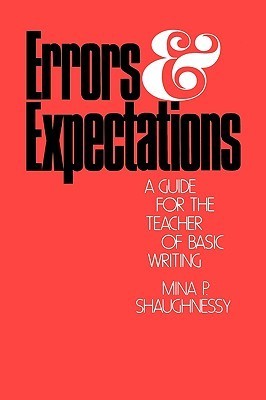First off, it is impossible to read Errors and Expectations without quietly humming Muse's "Black Holes and Revelations." It isn't possible.
Secondly, I wish I had read this book while I was teaching this semester. When I encountered the whirlwinds of my students' errors, I was kind of just flummoxed. "Proofread," I recommended, or "read it aloud," or "see if you can say that in fewer words." Reading Shaughnessy's book has been like learning the names of the trees in your neighborhood--you've always known there was something there, but you hadn't anticipated the order and reasoning of it all.
Shaughnessy includes plenty of lesson plans and suggestions for what she calls "Monday morning" and while some of it seems old-fashioned (handwriting! who considers handwriting a part of English?), there are plenty of post-it notes for things I'll actually use.
The best part of this book, though, is the research. Her methods aren't explicit, but her data set is huge and I appreciate the fact that she looks at errors as natural consequences of learning patterns, not deviant behavior.

